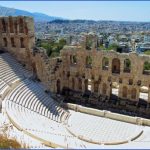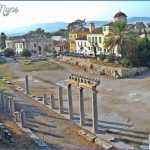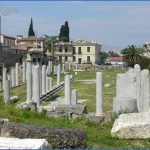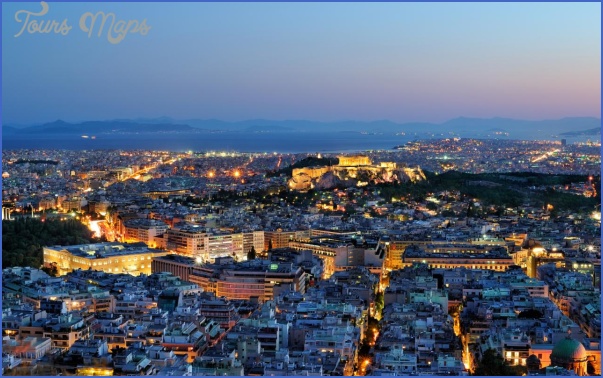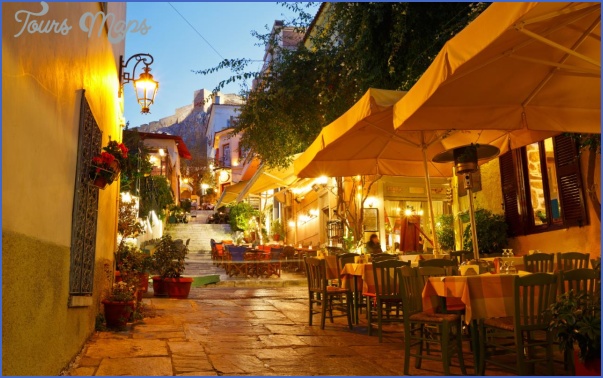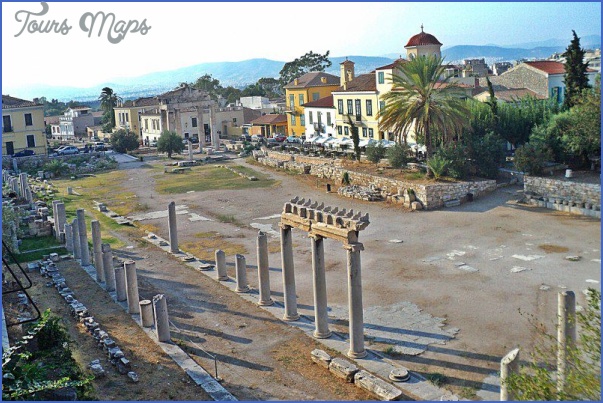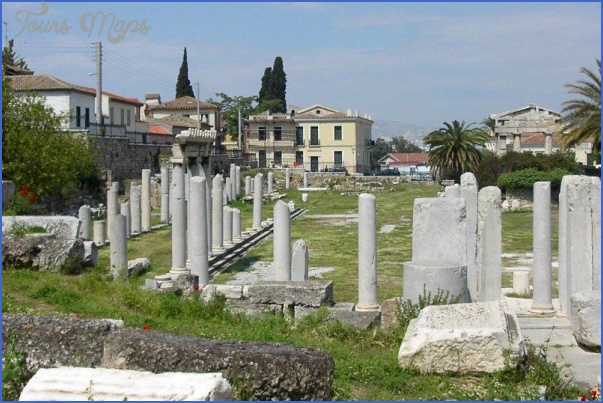Athens Travel Destinations
SUMMER OLYMPIC GAMES
In 776 BC, nearly three millennia ago, the first recorded Olympic Games were held in the olive-shrouded plains of Olympia on the Peloponnese. Two hundred ninety-three Olympiadas later, in AD 393, Roman rulers banned the practice in Greece, and the Games did not return to Athens again until 1896. In the summer of 2004, from August 13-29, 5.3 million spectators, along with 4 billion viewers across the globe, will watch the Olympic Games return to the land of their ancient birth.
The city has been busy preparing for the return of the Games. The past few years have seen the revival of the public transport system, featuring a new tram; the construction of a brand new Suburban Rail that will connect the city center’s Metro system with the airport, the Peloponnese, and numerous international train lines; and the renovation of the Attiki Odos a 6-lane, 70km motorway.
The city is ready to accommodate a modern-day audience, and the tone of the Games is being modified to reflect an increasingly interdependent global society. In ancient times, warring city-states would place down their weapons to compete in a nobler medium of human interaction. This year, for the first time in history, the torch relay, intended to inspire all countries to unite in the Olympic Truce, will travel to five continents on the globe.
TICKETS. The average ticket for the Athens 2004 Olympic Games goes for ‚35. Tickets include free transportation to and from all competition venues and are available through the National Olympic Committee of an interested party’s country or through the official ticketing website: www.athens2004.comtickets. The first phase of ticket sales began and ended in the spring of 2003. Premium ticket packages are currently available on a first come, first serve basis. These highly coveted packages include seats to the highest-demand Olympic events (Opening and Closing Ceremonies, the finals of the most popular competitions) and range from ‚3500 to ‚71,000. For more information, contact the Ticketing Call Center (within Greece: 800 11 2004 02, outside of Greece or using mobile: 30 210 373 0000). For updates and more information, the official website of the Athens 2004 Olympic Games is: www.athens2004.com.
TRANSPORTATION. Athens’s extended and renovated public transport system will be the primary vessel for movement during the Games. The Metro, along with the new tram and new Suburban Rail, will move approximately one million passengers per day. The largest venue complexes (the Athens Olympic Sports Center, the Hellinikon Olympic Sports Center, and the Faliro Olympic Coastal Zone) will be directly serviced by one or more of these lines, as will many others near and around the city center. Venues not directly serviced by these lines will be accessible through a combination of the public transport system and specially running Olympic Transport shuttles that will leave from Metro, tram, and Suburban Rail terminals, using the 210km of new and upgraded roads scheduled to be ready in the Athens area by the start of the Games. Public transportation will be free for all ticketed spectators to and from Olympic venues. Parking is also available at a distance from the venues accessible by shuttles.
ORIENTATION. Competitions in 28 sports, as well as broadcasting services and accommodations for athletes, will be held in 38 Olympic venues. While the majority are located in and around Athens, events will also be held in Thessaloniki and Volos in Central Greece, Patras in the Peloponnese, and Iraklion on Crete.
ACCOMMODATIONS. Preparing to accommodate an influx of 5.3 million spectators, more than double Athens’s winter population, has been among the greatest challenges faced by the city and organizing committee. By the time of the Games, there will be a total of 31,000 rooms in new and old hotels throughout the Athens area, but 17,300 of those rooms have already been reserved for use by the press and the family of participants in the Olympics.
A shortage of rooms is almost guaranteed, but there are a number of alternative accommodations options available for the Games. A large number of private residences in the Athens area will open their houses for rental. Two joint venture contractor bodies are officially responsible for putting owners in contact with tenants for the 16 days of the Olympics: Alpha Philoxenia 2004 (30 210 327 7400; fax 210 327 7444; cpallis@alphaastikaakinita.gr) and Elliniki Philoxenia ( 210 327 7403 and 327 7406; gmanzavinatos@eurobank.gr).
Eleven conveniently located cruise liners, with a combined total of 6489 cabins in the 3-5 star categories, will be docked in the port of Piraeus. Amenities include cinemas, spas, restaurants, swimming pools, libraries, children’s play rooms, and Internet cafes. Docked liners will include the German AIDAvita (49 69 695 801 18; fax 49 69 695 801 30; Heike-Marie.Ebel@DSM-01ympia.de; ask for Mrs. Heike-Marie Ebel); the MS 00STERDAM and MS ROTTERDAM (30 210 322 1500; fax 30 210 331 6684; sales@sportius.gr; ask for Mrs. Calli Georgiades); the Olympic Voyager, Olympic Explorer, and Olympic Countess (30 210 429 1000; fax 30 210 459 7482; sales@roc.gr; ask for Mr. Evan Pezas); and the luxurious Queen Mary II (cruiseships@athens2004.gr).
Accommodations are also available on nearby islands, including Salamina, Aegina, Hydra, Spetses, and Evia, all of which will be much more frequently serviced by high speed ferries during the Games. Staying in nearby towns and cities in the Peloponnese, serviced by the new Suburban Rail, is another viable alternative.
OLYMPIC VILLAGE. The Olympic village, north of Athens at the foot of Mt. Pami-tha, is an enormous complex. During the Olympic Games it will accommodate
16,000 athletes and team officials; during the Paralympic Games later in the year, it will house 6000. The facility includes a Residential Zone, with over 2200 apartments and training facilities, as well as an International Zone, which incorporates the main entrance, shopping centers, administrative buildings, and the Olympic museum.
ATHENS OLYMPIC SPORTS COMPLEX (0C0). The Athens Olympic Sports Complex is located 9km north of the center of Athens and 11km south of the Olympic Village in Pamitha, where all athletes will stay, is in the residential northern suburb of Marousi. The complex will host 9 sports including track and field, track cycling, swimming, and diving. The jewel of the central complex, the Olympic Stadium (STA) has the largest capacity of all the sports venues in Attica and will host a crowd of 75,000 spectators on August 13 for the opening of the Games and on August 29 for its closing. Track and field will take place from August 20-28. The stadium is expected to be fully renovated by April 2004.
The vast Olympic Indoor Hall (OIH) will hosts 15,000 guests at the artistic gymnastics competitions (Aug. 14-19, and 22-23) and trampoline gymnastics (Aug. 20). Near the end of the Games, 18,000 fans will flood the hall during the basketball finals (Aug. 25-28). The OIH is expected to be up and running by October 2003. An audience of 16,600 is expected at the Olympic Tennis Center (TEN) to watch the tennis competitions (Aug. 15-18; finals Aug. 19-22). The center boasts 16 courts. The main court seats 8000; the two semifinals courts 4000 and 2000, respectively; and the 13 others 200 each. TEN was completed at the end of the summer of 2003.
The grand Olympic Aquatic Center (AQU) is made up of two outdoor pools, the main pool (capacity 11,000) and the synchronized swimming pool (capacity 5000), as well as an indoor pool (capacity 6500). The Indoor Pool will host diving (Aug. 14, 16, and 20-28) and the water polo preliminaries (Aug. 15-21). Swimming (Aug. 14-21) will come to the main pool, which will also host the water polo finals (Aug. 22-27). Synchronized swimming (Aug. 23-24 and 26; finals Aug. 25 and 27) will be held in the synchronized swimming pool. The Aquatic Center is expected to be fully renovated by the end of 2003. The sleek and modern Olympic Velodrome (VEL), totally overhauled for the Games, will host track cycling (Aug. 20-25) for an audience of 5000 anxious onlookers. Renovations will be completed around January 2004. (Take Metro green line 1 from Omonia toward Kifisia to Eirini. Or, from the Suburban Rail, take blue line 3, get off at Neratziotissa, then board Metro green line 1 toward Piraeus, again getting off at Eirini.)
FALIRO COASTAL ZONE OLYMPIC COMPLEX (FCO). The stretch of southern Attican coastline between Piraeus and the beach suburbs of Gyfada, Vouliag-meni, and Varkiza was once a neglected sight, covered with piles of old boats and unfinished construction. The addition of the Faliro Coastal Zone Olympic Complex, which will host four of the 28 Olympic sports, has brought beautiful gardens, walkways, and a state-of-the-art marina. The closest venue to the bus-
Athens Travel Destinations Photo Gallery
Maybe You Like Them Too
- Explore Les Accates, France with this Detailed Map
- Explore Góra Kalwaria, Poland with this detailed map
- Explore Gumdag, Turkmenistan with this detailed map
- Explore Telfes im Stubai, Austria with this detailed map
- Explore Langenselbold, Germany with this detailed map

